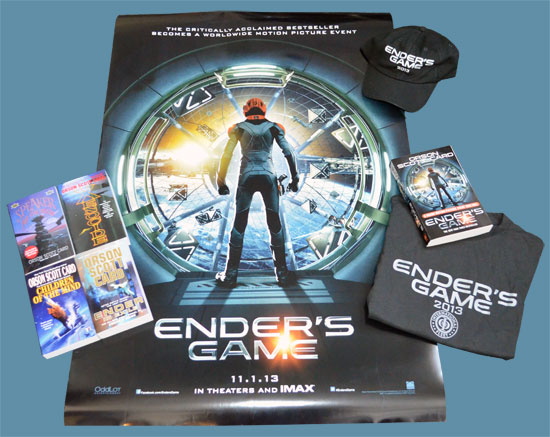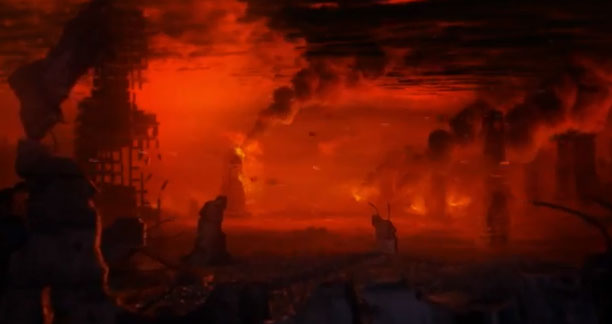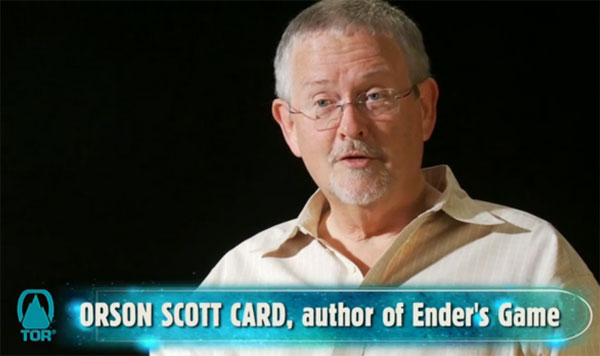Ender’s Game author Orson Scott Card Q&A from Andy Lindsay on Vimeo.
In a video Q&A produced for Tor Books, author Orson Scott Card talked about his personal favorites in books, movies, authors, and tv shows. A couple of questions centered around Ender’s Game:
With Ender’s Game you’ve written young characters who appeal strongly to adult readers. What’s your secret for engaging both YA and adult readers?
If I knew that I would do it every time because not every book appeals to everybody. But I always try to appeal to everybody. I always aim at the widest possible audience. But the truth is the only difference between young readers and older readers is young readers are patient with one kind of bad writing and older readers are patient with another kind of bad writing. I try not to do bad writing. I try to write as clearly as I can, a story that I care about and believe in and then hope that there are readers that will care about it and believe in it as well.
Why did you decide to use a young boy as the protagonist in a book about a great war between humanity and aliens?
Gotta remember, this started as a short story and I had no plan for a book at the time. The story idea that I had was the Battle Room, a safe place to train people for zero gravity combat, for thinking in zero g. I had that since I was 16 years old, but I had no story and I knew I had no story until I was in my early 20s and I finally realized, no, the time to train people for space combat is not when they’re adults, not when they’re 18 or 19 years old, they have too many gravity bound habits. You gotta grab them when they’re kids. When I realized that they were children, that they would be starting with 6 and 7 year-olds, taking them away from their families, then I had a story. And that’s when I wrote Remember the enemy’s gate is down. But when I started that short story I had no idea that it would ever be a novel. I had no idea how it would end. I didn’t even know that it would ever leave the Battle School and go to another place and involve a wider war so I just used a placeholder alien. The standard giant insect alien from science fiction. It was a MacGuffin, nothing more, so it’s not a book about a war that happens to have a child as the protagonist, it’s a book about a child that happens to have a war as a setting.
Ender’s Game has often been cited as a good book to read by readers who are not fans of science fiction. Why do you think it appeals to both fans and those who do not usually read science fiction?
I think it’s because I’m in the latter category. When I was growing up, science fiction was part of my reading, but only accidentally. I read everything. I was reading classics. I was reading historical fiction, romantic fiction, I read whatever was interesting at the time. A lot of non-fiction as well. But science fiction was valued not because of the genre itself, I never thought of myself as a science fiction reader, I simply loved certain science fiction writers. So I first discovered Heinlein and Norton in junior high library and devoured everything that they had written in book form at that time for the juveniles, the young adult fiction. THen in college I discovered Ray Bradbury, Isaac Asimov and loved them for the things that they taught me and Larry Niven came the last of all, but those writers are the ones that I think shaped me as a science fiction writer. But, they were never the majority of my reading. I was as likely to be excited about other authors as I was about them. So I think that I bring to writing an awareness of both the inside and the outside. I know enough about science fiction to write, to use the tropes, to use the techniques and methods of science fiction, but then I’m also writing to people like me who are not committed to the field. I’m not writing to insiders. I feel like I’m starting from ground zero. I write for a bare stage, I’m a playwright before I’m a writer of fiction and I write for Shakespeare’s stage. I write for Shakespeare’s audience really, people who expect to have the actor’s words tell them everything that they need to know, so that results in a kind of writing that is very spare. I only tell you what you need to know. I wrote 250 audio plays when I was starting out in my career. This is truly voice alone storytelling, so that only what the character’s say to each other is going to convey the meaning and the setting, everything. So that’s the way that I write. I make sure that all the information is present in the story. I don’t expect you to already bring to it a full knowledge of this or that novel, this or that tradition in science fiction. I make everything self contained and I make it very spare. That’s why people who try to abridge my work despair. There’s nothing there for fluff or decoration. It’s there because it’s functional in the story.
Source: Andy Lindsay on Vimeo


